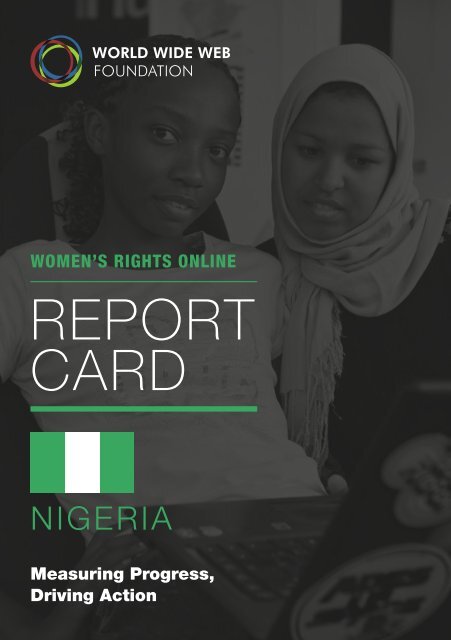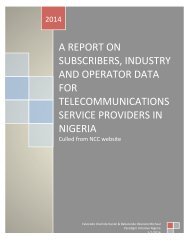REPORT CARD
WF_GR_Nigeria
WF_GR_Nigeria
You also want an ePaper? Increase the reach of your titles
YUMPU automatically turns print PDFs into web optimized ePapers that Google loves.
WOMEN’S RIGHTS ONLINE<br />
<strong>REPORT</strong><br />
<strong>CARD</strong><br />
NIGERIA<br />
Measuring Progress,<br />
Driving Action
EMPOWERMENT<br />
INTERNET ACCESS & WOMEN’S<br />
NIGERIA<br />
OVERALL SCORE:<br />
SCORE: 2<br />
30 %<br />
Just 36% of poor women in Lagos use the Internet.<br />
Only 10% of women Internet users had ever searched<br />
for information on sexual and reproductive health online,<br />
while 19% have looked for a job using online portals.<br />
AFFORDABILITY<br />
DIGITAL SKILLS & EDUCATION<br />
SCORE: 5<br />
SCORE: 2<br />
67% of women in Lagos reported being unable to<br />
afford a 1GB data plan. The recent abolition of a<br />
regulatory minimum on data prices has led to dramatic<br />
cost reductions, although a proposed 9% tax on data,<br />
if approved, could reverse much of that progress.<br />
The Government has launched initiatives such as<br />
‘Smart-Woman Nigeria’ and the ‘Digital Girls’ Clubs’<br />
in secondary schools, but education is not explicitly<br />
addressed in the 2012 national ICT policy. There<br />
is no data on the number of schools connected to<br />
the Internet.
ONLINE SAFETY<br />
RELEVANT CONTENT & SERVICES<br />
SCORE: 3<br />
SCORE: 3<br />
Information about women’s health, rights and other<br />
services that promote women’s well-being is lacking<br />
online. Most websites are in English, and many women<br />
with limited education are unlikely to benefit. Just 2%<br />
of women have access to mobile financial services.<br />
The Cybercrime Act criminalises cyberstalking but not<br />
harassment or other violence against women online.<br />
Women say that police rarely pursue charges of online<br />
harassment. Nigeria lacks a data protection framework.<br />
However, the Digital Rights and Freedoms bill now in<br />
the legislature would guarantee privacy rights.<br />
CLOSING THE GENDER GAP: A 5 POINT ACTION PLAN<br />
1<br />
2<br />
3<br />
4<br />
5<br />
SET GENDER TARGETS FOR THE NATIONAL ICT POLICY. Update the Nigerian National<br />
ICT Policy to prioritise access for women and girls, with measurable and time-bound targets. Based on this,<br />
design specific interventions or programmes (with adequate budget) encouraging increased access, training<br />
and use of the Internet for the specific groups of women and girls currently most likely to lack Internet access.<br />
IMPROVE INTERNET ACCESS AND AFFORDABILITY. Government should work towards<br />
a target of 1GB of mobile data priced at 2% or less of average monthly income, as recommended by the<br />
Alliance for Affordable Internet - of which Nigeria is a member.<br />
INTEGRATE DIGITAL SKILLS IN PRIMARY SCHOOL CURRICULA. Education policy<br />
should make the teaching of basic ICT skills compulsory at the primary school level to spark interest in<br />
ICT among young girls.<br />
PROVIDE RELEVANT CONTENT AND SERVICES ONLINE. Government must prioritise<br />
wide online availability of local language information about women’s health, rights and services that<br />
empower women.<br />
PASS THE NIGERIA DIGITAL RIGHTS AND FREEDOM BILL. Protect the rights and privacy<br />
of both female and male users of digital platforms by passing the Nigeria Digital Rights and Freedom Bill<br />
into law, to encourage optimum online participation.
PROJECT OVERVIEW<br />
The United Nations recently<br />
made gender-equitable access to<br />
information and communications<br />
technologies (ICTs) central to the<br />
Sustainable Development Goals<br />
(SDGs), which set the global<br />
development agenda until 2030.<br />
Why? ICTs are powerful. They can help to<br />
deliver improved healthcare, quality education<br />
for all, financial inclusion, more accountable<br />
government, and much more. In adopting the<br />
SDGs, all countries have pledged to prioritise<br />
universal Internet access, and to use ICTs to<br />
empower women.<br />
But much hard work lies ahead if we<br />
are to translate this vision into reality. A<br />
formidable gender gap in Internet access,<br />
digital skills and online rights exists - our<br />
Women’s Rights Online research shows that in<br />
many communities, women are 50% less likely<br />
than men to be online and 30-50% less likely<br />
to use the Internet for economic and political<br />
empowerment. Women face many barriers -<br />
including high costs, lack of know-how, and a<br />
scarcity of relevant and empowering content -<br />
as well as social and legal obstacles to speaking<br />
freely and privately online.<br />
The Web Foundation and partners have<br />
prepared these gender audits to help countries<br />
assess what they need to do to overcome<br />
the gender digital divide. Paradigm Initiative<br />
Nigeria has taken the lead, in consultation<br />
with other national stakeholders, on identifying<br />
concrete steps that government can take in<br />
the next year to address the challenges and<br />
gaps identified. We hope that this report card<br />
and action plan will spark debate and galvanise<br />
policy change.<br />
A NOTE ON METHODOLOGY:<br />
We based our scores on 14 simple indicators for which reliable empirical evidence<br />
exists, and grading was done in the second quarter of 2016. See the accompanying<br />
overview for a description of the indicators and sources used. A full methodology is<br />
available on our website.<br />
Produced in collaboration with:<br />
With support from:<br />
PARADIGM<br />
INITIATIVE<br />
NIGERIA




